Top 5 Myths Related to E-waste Management in India
The crisis of e-waste management in India is the cost the country has had to pay for becoming one of the fastest-growing IT economies in the world!
There is no better feeling than unboxing your newly bought electronic device, be it a new phone, a new laptop, or the latest fitness watch. But do you ever think about what happens to the old phone, old laptop, or your old fitness watch?
E-waste management in India has caught the attention of the people only recently, the E-Waste (Management) Rules in 2016 rolled out by The Ministry of Environment, Forest and Climate Change, and initiatives are taken by some private organizations such as Greentek Ramen, GIZ, etc. have helped improve the crisis of E-waste management in India to some extent. But is it enough? Is the general public making a conscious effort to mitigate this crisis?
In today’s article, we will discuss the top 5 Myths related to E-waste Management in India, to help our readers have a better understanding of this crisis.
The Myths:
Myth number 1: Only Large Electronic Devices Such as Computers and TVs are worth Recycling
A lot of us have this misconception that small devices such as mobile phones, remotes, watches, etc. are not worth recycling as they are so small. But in reality, it is the opposite.
The small components of such devices use a lot of toxic chemicals, which should be prevented from ending up at landfills at all costs.
Myth number 2: The E-waste will get Shipped to Some Other Country
This is true to some extent, but when it comes to e-waste management in India it is not true. India, like many other developing countries, actually receives a lot of e-waste. So, the e-waste management in India is not only burdened by its own country’s e-waste but also by other countries.
Seelampur in Delhi is one of the largest e-waste dismantling centers in India. Where adults, as well as children of different ages, are exposed to harmful chemicals.
Myth number 3: Electronic Recycling Wastes a lot of Resources and Energy
This is one of the biggest myths when it comes to e-waste management. But in reality, recycling old electronic devices helps us recover and recycle a lot of valuable metals.
This makes e-waste recycling and e-waste management in India especially important because India imports a lot of its metals.
Myth number 4: Recycling Electronic Devices Can Lead to Data Theft
This is actually a very legitimate concern and there have been a lot of instances where people have fallen prey to data theft when they gave their electronic devices for recycling.
But today, we have ITAD companies, which stand for IT Asset Disposal. They help you not only safely wipe out your data but also help you in safely disposing of/ recycling your electronic devices.
GreenTek Reman is one such company that provides ITAD services and has helped make E-waste Management in India completely safe and secure.
Myth number 5: E-waste is not that Harmful
Many believe that most of the e-waste that we generate is not actually harmful and is safe to be dumped on landfills.
But most of the electronic devices that we use consist of harmful metals such as led, beryllium as well as nickel. Such metals are carcinogenic in nature, which is a leading contributor to cancer.
Dumping such toxic metal in landfills possess a special challenge when it comes to e-waste management in India as more than half its population is dependent on agriculture and most of its population is dependent on groundwater for their everyday water.
Now that we have addressed some of the most common myths when it comes to e-waste management in India, I hope you will make a conscious effort to recycle your electronic devices the next you replace them.
Click here if you would like to know more about e-waste management and e-waste management in India in particular.


